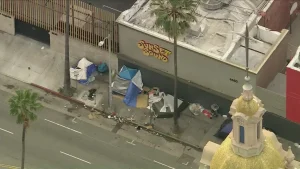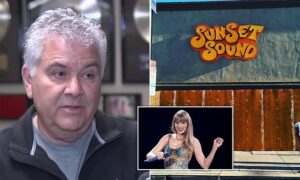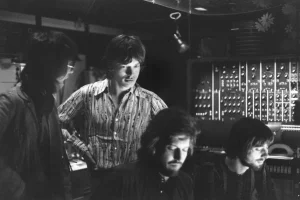Sunset Sound’s Studio 1 control room is a legendary place in pop and rock music history. The venue in Los Angeles has welcomed giants such as the Doors, Rolling Stones, Beach Boys, Van Halen and Sir Paul McCartney. They recorded albums that defined their eras there, while Jim Morrison, on LSD, once wrecked the studio with a fire extinguisher.

But the studio, one of the few remaining in Hollywood after many closed due to high costs and new technologies, faces a danger worse than a single wild rock star. Sunset Sound’s three studios have produced more than 300 gold records but they could be ruined by a filthy homeless camp next to the building. Garbage is stacked high, needles and pipes are scattered on the ground and homeless people use the street as a toilet.
Paul Camarata, the owner, said the studio was twice endangered by fires that could have spread from the camp’s tents. Staff have been harassed by mentally ill homeless people. Sir Elton John and Miley Cyrus’s producers wondered what was happening with the dirty tents outside, Camarata, 70, said. Taylor Swift vowed never to record at Sunset Sound again after a run-in on her way back from a nearby 7-Eleven store. “She wasn’t attacked or anything, but she was bothered. And enough to the point where she said, ‘I’m not coming back’.”

He added: “I kind of compare it to a restaurant. You go to a restaurant once or twice, and you have a bad meal. You’re probably not going to complain, you’re just not going to go back. And that’s what I’m afraid of here. If we don’t have business because of the environment that’s around this building, then I don’t know how we survive. This is a big problem.”
If Sunset Sound closed it would be a loss for the Los Angeles music scene. The studio was founded in 1960 after Camarata’s father Tutti was asked by Walt Disney to start a record label for the company. Disney did not want a recording studio at Burbank so Tutti Camarata, who died in 2005, opened one on Sunset Boulevard. Some of the Disney songs recorded there were for the 1961 version of The Parent Trap and for Mary Poppins.
Studio 1 became known for its excellence, Camarata said, and musicians soon  came knocking. Herb Alpert, the American trumpeter, liked Sunset Sound so much that he tried to buy it but Tutti Camarata said no. The Doors, the Los Angeles band led by the unpredictable but brilliant Morrison, made their first album at the studio.
came knocking. Herb Alpert, the American trumpeter, liked Sunset Sound so much that he tried to buy it but Tutti Camarata said no. The Doors, the Los Angeles band led by the unpredictable but brilliant Morrison, made their first album at the studio.
Morrison, who died aged 27 in 1971, left a lasting impression at Sunset Sound. While making that 1967 album the singer “took some acid” according to Camarata, and went to an all-night church across the street. The story goes that Morrison had a “revelation” and came back to the studio, climbing over a fence and breaking into the building. He thought the studio was on fire and started putting out “flames” with a fire extinguisher.

“He hit mostly all their equipment,” Camarata said. “Some of ours like microphones and stuff but mostly their equipment. Luckily he did not come into the control room.” Who ruined the studio that night might have stayed a mystery had Morrison not left a boot on the fence on his way out. Staff found it and figured out who did it. Jac Holzman, president of Elektra Records, the Doors’ label, said he was sorry but Tutti Camarata forgave the erratic Morrison.
Paul Camarata, who became president of Sunset Sound in 1980, said: “My dad was like, ‘hey, look, I’m a musician, too. I’ve seen some crazy stuff. It wasn’t that bad. We cleaned it up. Let’s just get back to making music’. And they did.” The Beach Boys recorded parts of the 1966 album Pet Sounds at Sunset Sound and the Rolling Stones made Beggars Banquet and Let It Bleed there. In the 1980s Van Halen and Prince were often there.
The rich history of Sunset Sound is what draws modern musicians to the studio, said Josh Lawrence, 32, the studio manager. “The clients that come here sense the history,” he said. “They want to tap into some of that when they’re recording.” He worries that the homeless camp will scare away clients. He said they had pleaded with the council to remove the tents but had been overlooked.
Los Angeles council district 13, where the studio is situated, said it had more than 3,000 people sleeping on the streets but only 400 beds. Camarata said that if he had to close down then Los Angeles’ musical heritage would suffer a huge loss. “We are an institution,” he said. “If Sunset Sound was to shut down, I think it would be disastrous for the music community. Once it’s gone, it’s gone for good.”


